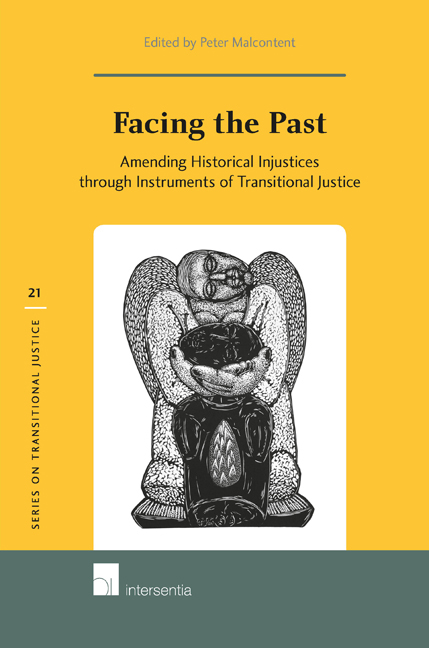Book contents
- Frontmatter
- Acknowledgements
- Contents
- PART I TRANSITIONAL JUSTICE. WHAT'S IN THE NAME?
- PART II RETRIBUTIVE JUSTICE
- Introduction
- Pacting the Law within Politics. Lessons from the International Criminal Court's First Investigations
- National and Hybrid Tribunals. Benefits and Challenges
- Beyond the Courtroom. The Objectives and Experiences of International Justice at the Grassroots
- From Gacaca to Mato Oput. Pragmatism and Principles in Employing Traditional Dispute Resolution Mechanisms
- Dealing with Organisations and Corporations
- PART III RESTORATIVE JUSTICE
- PART IV PENDING CASES
- Author Information
Pacting the Law within Politics. Lessons from the International Criminal Court's First Investigations
from PART II - RETRIBUTIVE JUSTICE
Published online by Cambridge University Press: 15 December 2017
- Frontmatter
- Acknowledgements
- Contents
- PART I TRANSITIONAL JUSTICE. WHAT'S IN THE NAME?
- PART II RETRIBUTIVE JUSTICE
- Introduction
- Pacting the Law within Politics. Lessons from the International Criminal Court's First Investigations
- National and Hybrid Tribunals. Benefits and Challenges
- Beyond the Courtroom. The Objectives and Experiences of International Justice at the Grassroots
- From Gacaca to Mato Oput. Pragmatism and Principles in Employing Traditional Dispute Resolution Mechanisms
- Dealing with Organisations and Corporations
- PART III RESTORATIVE JUSTICE
- PART IV PENDING CASES
- Author Information
Summary
INTRODUCTION
During his term as the first Chief Prosecutor of the International Criminal Court (ICC), Luis Moreno Ocampo often said that the Court was part of the transitional process for societies emerging from mass violence and repression. What he meant by that seems to have evolved over time. Early in his tenure, he characterised his decision-making as part of a ‘dialogue between many actors’ with a ‘strategic dimension (…) [that] involves all the stakeholders’, suggesting a process of consultation and coordination with local and international efforts at conflict resolution and peace building. Later, he denied that his office was party to any peace negotiations and was part of transitional processes only in the sense that the prosecution of those most responsible for international crimes is indispensable to a lasting peace. And, as in a domestic criminal justice system, this is a legal obligation to which political actors must conform rather than something that could be accommodated to the agendas of others: ‘The Prosecutor's duty is to apply the law without bowing to political consideration, and I will not adjust my practices to political considerations. It is time for political actors to adjust to the law’.
This approach to prosecutorial discretion is informed by the cosmopolitan values that animate the transnational network of nongovernmental organisations (NGOs) and international lawyers that are most supportive of the Court and were instrumental in its creation.3 It assumes that some wartime atrocities and human rights violations are so injurious to our common humanity that these practices should be removed from the realm of politics and treated as crimes. The ICC and its state parties have a consequent duty to ensure the prosecution of these crimes that should not be compromised by political factors, including peace processes. This position is based explicitly or implicitly on what Judith Shklar calls legalism, which she defines as ‘the ethical attitude that holds moral conduct to be a matter of rule following, and moral relationships to consist of duties and rights determined by rules’.4 From this perspective, the ICC represents the fulfilment of a vision for a just world order based on the globalisation of law while politics is disparaged as a defect to be removed if that vision is to be realised.
- Type
- Chapter
- Information
- Facing the PastAmending Historical Injustices Through Instruments of Transitional Justice, pp. 91 - 114Publisher: IntersentiaPrint publication year: 2016



